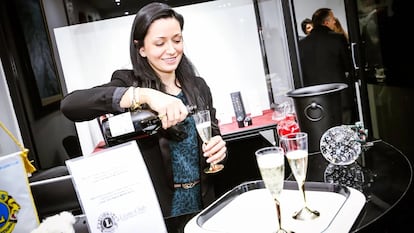The Peruvian jewelry designer’s alter ego: Russian agent
A woman who charmed her way into Italian high society was collecting intelligence about NATO for her Moscow spymasters


María Adela Kuhfeldt Rivera was sophisticated and friendly. The daughter of a German father and a Peruvian mother, she was one of those people who captivated everyone at cocktail parties. She had traveled the world exhibiting her exquisite jewelry collection. Her natural charm soon opened doors in Naples, where she began to make friends with US military personnel and people who worked at the NATO base there. She was skilled at creating intimate moments that loosened the tongues of even the wariest people. But they didn’t know who they were dealing with. María Adela was a high-level Russian spy who had worked undercover for years.
No one knows María Adela’s true identity. When her secret was about to be revealed, she jumped on a plane to Moscow and hasn’t left Russia since. Bellingcat, the Netherlands-based investigative journalism group, finally unmasked the 30-year-old woman who was invited to the fanciest dinner parties in Italy. Investigative journalists traced the passport numbers of the two undercover GRU agents (Russia’s military intelligence agency) who poisoned former Russian spy Sergey Skripal in England, and noticed that María Adela’s passport number followed theirs in sequential order. María Adela worked for the GRU, an agency that has been credited with everything from hacking Hillary Clinton’s emails to the attempted assassination of Skripal.
GRU agents are reputed to be the best in Russia, and the agency has a unit that specializes in developing spies who can impersonate foreigners superbly. María Adela fit the profile perfectly. She lived in Rome, Malta and Paris before arriving in Naples, where she opened a boutique called Serein. María Adela quickly made a name for himself in Neapolitan social circles, and became an executive member of the local Lions Club, which provided introductions to the city’s elite. María Adela also charmed her way into NATO circles, and supposedly had an affair with a NATO staffer, although this rumor has never been substantiated.
After Bellingcat’s 2018 revelation about how Russia’s military intelligence agency had furnished their spies with consecutively numbered passports, María Adela vanished. Two months later, as an explanation for her long silence, she posted on Facebook that she was undergoing chemotherapy. It was later discovered that she flew to Moscow on a passport from one of the number ranges Bellingcat had outed the previous day — her handlers had brought her in from the cold.
María Adela’s backstory was a picture of a cosmopolitan woman with Peruvian roots who had been raised in Russia — a citizen of the world. The kind of person who is everyone’s friend, but no one knows well. She claimed to have been born in Callao, Peru’s main seaport. She told people that she traveled to Russia with her gymnast mother who was competing in the 1980 Olympic Games in Moscow, but was left behind when her mother had to return home urgently. According to the story uncovered by Bellingcat, the young girl was adopted by a Soviet family and never returned to Peru. To explain why she preferred to live in the West instead of Russia, María Adela told people that her adoptive parents treated her badly and that she had been abused by the man.
The Kremlin attempted to craft an airtight identity for María Adela. In 2005, she filed papers with the civil registry in Lima for inscription of a new Peruvian citizen into the country’s national citizen database. Her lawyers presented a birth certificate registered in Callao on September 1, 1978. A Lima civil officer discovered that it was faked and handed the case over to public prosecutors. But the GRU spymasters went ahead with their own plans and issued her a Russian passport. The story of a girl abandoned by her gymnast mother seemed credible enough, at least until the truth came out 10 years later. María Adela Kuhfeldt Rivera, or whatever her name is, will probably resurface in a few years with another identity and maybe a new face.
Tu suscripción se está usando en otro dispositivo
¿Quieres añadir otro usuario a tu suscripción?
Si continúas leyendo en este dispositivo, no se podrá leer en el otro.
FlechaTu suscripción se está usando en otro dispositivo y solo puedes acceder a EL PAÍS desde un dispositivo a la vez.
Si quieres compartir tu cuenta, cambia tu suscripción a la modalidad Premium, así podrás añadir otro usuario. Cada uno accederá con su propia cuenta de email, lo que os permitirá personalizar vuestra experiencia en EL PAÍS.
¿Tienes una suscripción de empresa? Accede aquí para contratar más cuentas.
En el caso de no saber quién está usando tu cuenta, te recomendamos cambiar tu contraseña aquí.
Si decides continuar compartiendo tu cuenta, este mensaje se mostrará en tu dispositivo y en el de la otra persona que está usando tu cuenta de forma indefinida, afectando a tu experiencia de lectura. Puedes consultar aquí los términos y condiciones de la suscripción digital.








































